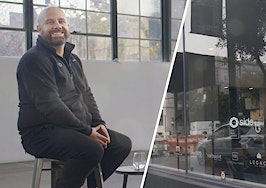In these times, double down — on your skills, on your knowledge, on you. Join us Aug. 8-10 at Inman Connect Las Vegas to lean into the shift and learn from the best. Get your ticket now for the best price.
Flexible living solution Landing is rolling out a new corporate housing program today, a little less than a year after it secured $125 million in a Series C round of financing.
Flex, Landing’s new offering, is designed to make easier the booking process for employee relocation and work assignments, according to a July 20 announcement Inman received.
The program allows users to book open-ended stays and requires no multi-month equipment. In short, it eliminates the need for a fixed reservation, meaning when a company project takes longer than expected, the resident can feel confident in the stability of their housing status.
The intent of the new approach is to ease communications and bookings for corporate schedulers and travel coordinators, according to the announcement.
“Once reservations have been made, Landing communicates move-in details directly with corporate members, taking that burden off the employer,” the company said.
In regard to Flex, founder and CEO of Landing Bill Smith said in a statement that traditional corporate housing processes have been “a slog.”
“Too often, professionals have had to deal with spotty availability, inconsistent quality, strict commitments, and a slow and painful booking process,” he said. “Flex introduces unparalleled convenience to our corporate partners, providing them with complete control over their housing accommodations and the flexibility they need to manage shifting timelines.”
Landing’s model enables people a flexible living arrangement through a 375-city (and growing) network of ready-to-go apartments. Better defined, subscription living. Customers can choose from furnished residences in multiple neighborhoods with an array of amenities. They can stay for as little as 30 days or for as long as they like. Renters have access to all of a community’s features and can bring pets.
To say the company timed the remote-work movement would be a remarkable understatement. Reuters reported on July 13, citing McKinsey, that remote work may reduce the nation’s overall office property value by $800 billion by 2030.
Nine cities were surveyed — Beijing, Houston, London, New York City, Paris, Munich, San Francisco, Shanghai and Tokyo — and results showed that demand for office space would be 13 percent lower in 2030 than it was in pre-pandemic 2019, according to Reuters.
The advantage of a model like Landing’s Flex is that companies can house remote and traveling workers under the same location, creating a collaboratively hybrid work environment. It can replace housing workers in separate hotels and multiple short-term rental scenarios.
“Flex unlocks access to Landing’s selection of 20K+ apartments in 375+ cities nationwide for bookings from 30 days to indefinitely, without the need to know when the stay will end in advance,” the company said.
Landing apartments are fully furnished and modern and meant to reflect a full-time living environment. Only 14 days notice is required for a move-out.
For noncorporate users, Landing has a model called Standby. For the very flexible remote worker, this program charges users $1,495 per month for access to every home in Landing’s network outside of New York and California, but likely for a much shorter amount of time.
Tenants can move into a vacant unit between longer occupancy periods. Should a 30-day or more tenant want that unit, the Standby user is “bumped” or required to move within three days. Landing takes care of the cleaning fee and the mobile app will direct the tenant to what’s available next. Landing will take care of the cleaning fee when bumped, but if the tenant has had enough of a city and wants out, they’ll pay the $150 fee.
“Having experienced skyrocketing demand among individual renters, expanding our offering to the business world is a natural step as we rethink how people will live, work, and travel in the future,” Smith said.













